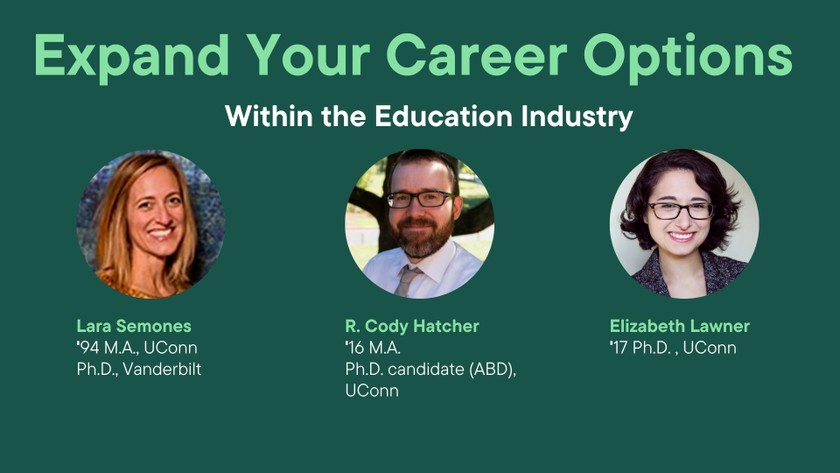
The education industry covers a variety of career fields such as research, educational technologies, online learning product providers, and publishing. A recent panel of graduate-level UConn alums shared their experiences working in the education industry, insights about their roles, and offered valuable advice for graduate students, especially doctoral students interested in exploring diverse career opportunities.
Panelists:
Lara Semones, ’94 M.A., UConn, Ph.D., Vanderbilt
R. Cody Hatcher, ’16 M.A. Ph.D. Candidate (ABD), UConn
Elizabeth Lawner, ’17 Ph.D., UConn
Working in the education industry
The speakers work in various roles in different organizations.
Lawner is a Director of Research at the Association of College and University Educators (ACUE), a startup that provides faculty development programs and services. She is in the analytic team that works on the program evaluation and implementation side and also provides data analysis for other teams within ACUE. What she enjoys a lot in her work is being able to directly impact the other teams in the organization and improve their work.
As a Learning Designer at the Center for Technology Enhanced Learning, University of Southern Maine, Hatcher conducts data analysis and provides reference for the university leadership in addition to instructional design. He likes the flexibility that his job offers and the variety of project-based work that keeps things interesting; also, as the Center continues to develop, he is able to share his recommendations about future projects.
Unlike Lawner and Hatcher, Semones works in a corporate environment where she believes “no day is the same.” Semones is a Senior Product Manager at Cengage, where she oversees product visioning, customer research, marketing, and support. Some of her favorite aspects of her work are listening to what users/students really want and taking recommendations from focus groups.
Skills needed for the field
While quantitative research skills are essential for some of their roles, communication skills also play a big part in the panelists’ work, especially when they need to talk to people who know little about their projects or fields. Another important skill is being responsive to change and knowing when to respond and react.
On being a competitive graduate-level job candidate
Strong job candidates have the narratives ready that showcase their skills and competencies. They also have some experience in an applied role that makes them stand out.
While a graduate degree may not necessarily make someone stronger for a position, it can offer credibility, especially when someone is working with an organization’s leadership.
Career progression in the field
Semones suggested taking on more duties can sometimes lead to a new role because you can showcase more of your skills. A new role might mean an increase in income and recognition, but it could also mean more responsibilities and less flexibility.
In Lawner’s field, an individual usually starts as a Research Associate and can progress to Director of Research. For Hatcher’s role in higher education, someone could take an administrative path, from a director role leading to Vice Provost and Provost. While these roles would take one away from more practitioner-based work, they could also move laterally or go out into industry.
Where to find jobs
A LinkedIn search in the fields of one’s interest would be useful, coupled with connecting with people and making use of informational interviews. The organizations’ websites and The Chronicle of Higher Education are also important sources.
A career beyond academia
Some career advice from the panelists to graduate students who are interested in exploring diverse career options:
– learn from examples of people working in the industry with a doctoral degree,
– gain some work experience through, e.g., internships, and know what options are available,
– take a few courses outside of your academic field that interest you,
– take advantage of campus committee involvement,
– don’t feel boxed in by your program – you have a lot of skills that you can transfer, and
– make an inventory of all your skills.
Specifically designed for graduate students, Expand Your Career Options occurs every semester and features UConn graduate alums who pursue a range of careers.
